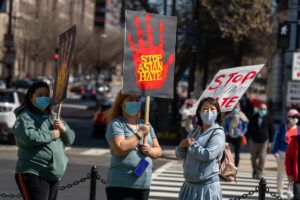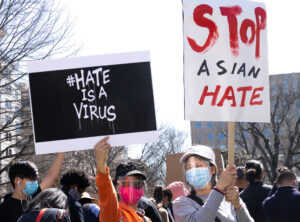
The rise of anti-Asian rhetoric in recent years has sparked great concern within Asian American and Pacific Islander (AAPI) communities. The surge in hatred towards Asian Americans, specifically Chinese Americans, can be attributed to the COVID-19 pandemic. This has led to an alarming increase in violent crimes and discrimination against Asians across the United States (U.S.). After the Atlanta shooting in March 2021, where an Asian-owned restaurant was targeted by a shooter, resulting in the loss of eight lives, this issue was highly publicized. Other instances of inflammatory speech and prejudice gained traction, with 10% of AAPI individuals having experienced hate incidents or crimes in 2021. In light of these shifts, policymakers and political figures should take decisive action to address the injustices faced by AAPI communities to curtail the spread of misinformation and hate.
The alarming rise in hate towards the Asian American community has gained media attention and led to the creation of several non-profit organizations and coalitions. One coalition that significantly contributed to spreading awareness of the ramifications of anti-Asian rhetoric and bringing social media attention to this issue is the Stop AAPI Hate Campaign. Launched in March 2020, this national coalition was created by Cynthia Choi, Russell Jeung and Manjusha Kulkarni after the three noticed a pattern of discrimination through analyzing news stories. Their mission is focused on dismantling existing discriminatory structures and combating injustices inflicted upon the AAPI community.

As the 2024 presidential election approaches, the Stop AAPI Hate Campaign and Chinese for Affirmative Action are promoting their Stop the Blame Campaign, which focuses specifically on confronting anti-Asian scapegoating and political accountability for leaders using racist and discriminatory language. In their quest to stop anti-Asian rhetoric in the political sphere, the campaign outlined four essential elements: holding leaders accountable, fighting against land ownership bans for Chinese immigrants, reforming the Foreign Intelligence Surveillance Act (FISA) to include Asian communities and educating the public.
Fighting against discriminatory land ownership policies that impact innocent Chinese immigrants can be integral in reducing the barriers to integration and assisting the AAPI community. Similarly, reforming FISA, specifically section 702, can be a significant gain for the community as the legislation has been criticized for being used as a tool to racially profile and some lawmakers claimed that the discriminatory targeting can harm national security.
The Stop AAPI Hate Campaign’s role has become all the more critical with the rising adversarial relationship between China and the U.S. The competition between these major power nations could significantly impact conversations surrounding American foreign policy and national security during the presidential debates. Animosity toward the nations and presidential styles can impact the accidental or purposeful spread of anti-Asian rhetoric and hate, specifically toward Chinese Americans.

While Stop the Blame campaign’s steps to hold officials accountable are useful in spreading information about the increased prejudice experienced by the AAPI community in recent years, it is likely difficult for the organization to create an active, meaningful impact during the elections period as the majority of their work deals with the aftermath of anti-Asian speech. Despite likely difficulties in emphasizing and educating the public on this issue, the Stop AAPI Hate Campaign has made positive contributions in benign attention to the importance of mindful language and accountability. Alongside considerable social media support, legislative reforms have also been put into action with Congress’ approval of the COVID-19 Hate Crime Act to support training to address hate crimes against communities of color.
At its inception, this campaign was effective in educating and combating anti-Asian rhetoric prompted by COVID-19. With the approaching election and increasing animosity between D.C. and Beijing, the coalition has the opportunity once again to step up and speak out on the discriminatory legislation and harmful speech made during the election when discussing Asian individuals and nations. Addressing the repercussions of these geopolitical tensions on Asian Americans is more than important, it’s a moral obligation.







